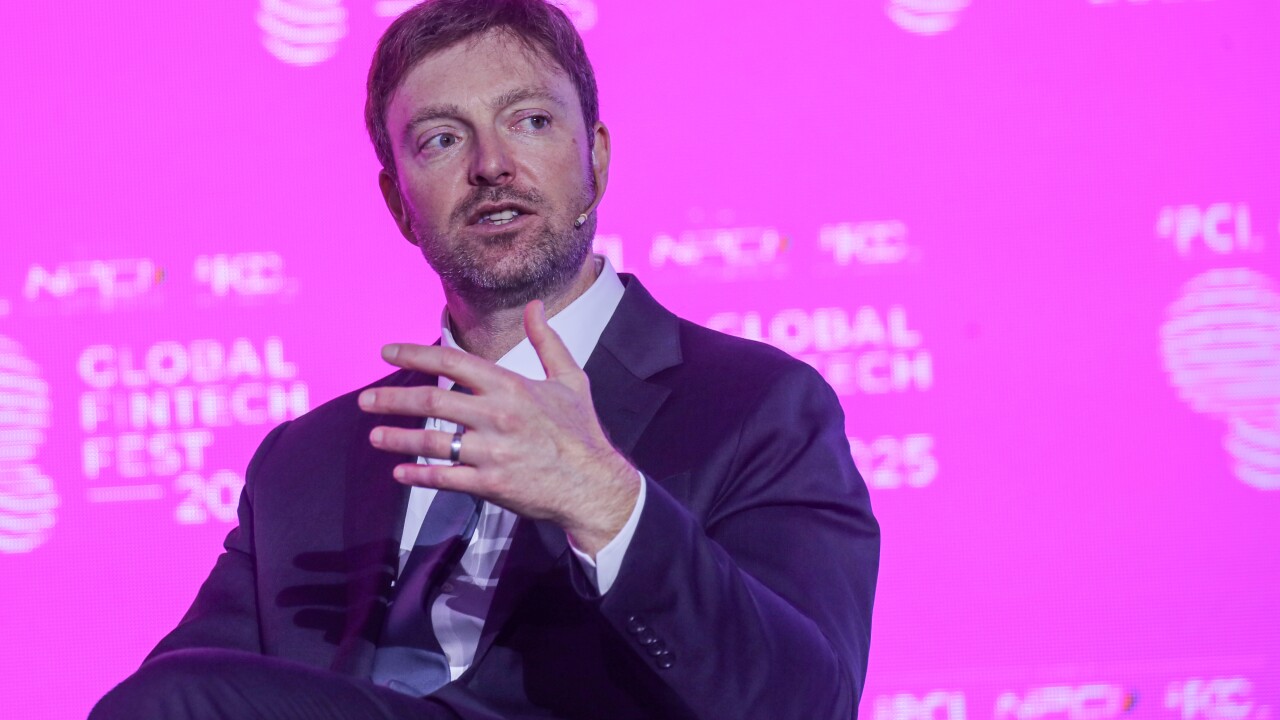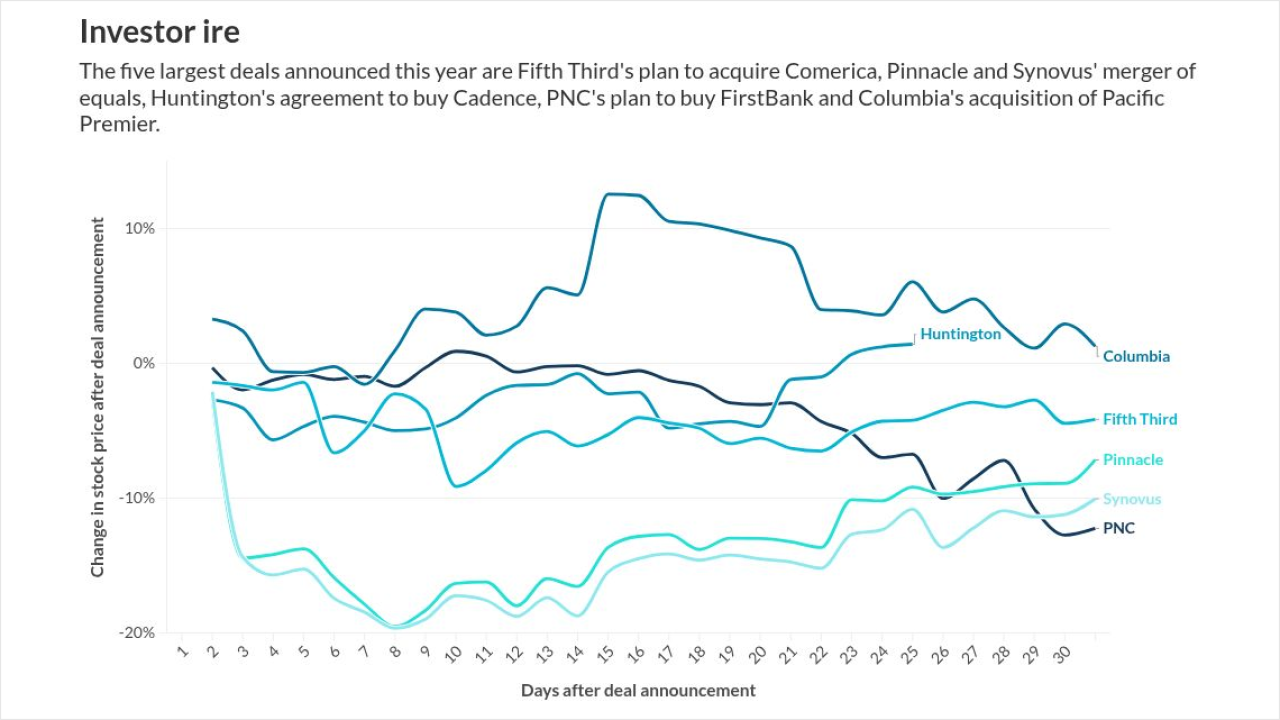Having beaten analysts' earnings estimates for seven consecutive quarters, PeopleSoft must be doing something right. And financial services institutions are taking notice.
But how deserving is the Pleasanton, CA-based company of its self- appointed title, "the leading global ebusiness solutions provider in the financial services industry?"
According to Craig Himmelberger, director of retail banking and capital strategies at PeopleSoft, financial institutions have always been at the top of his company's list. "Our first application sales were to financial services companies. This is the largest and fastest-growing industry represented in the PeopleSoft customer base."
This may not be much of an exaggeration considering that, out of 4,000 customers, 540 are financial services companies. Clients include Bank One Corp., Merrill Lynch and Mutual of Omaha.
Still, Regan Wong, a senior analyst with Needham, MA-based TowerGroup, does not quite see things this way. Although he acknowledges PeopleSoft has put a lot of money into creating products for the financial services space, Wong adds that he wouldn't "go so far as to say that when you mention 'PeopleSoft,' financial services will be the first thing you think of. But PeopleSoft wants to be a big player in this area."
Things weren't always rosy for PeopleSoft. Throughout the late 1990s, the company experienced some tough times on Wall Street. Wong says this was due in part to Y2K. There was a significant slowdown for PeopleSoft and many others during this period. "After Y2K, people looked at replacing their older, more complicated systems and they gave PeopleSoft a look. It doesn't surprise me that they rebounded."
Among the company's major product rollouts is PeopleSoft 8, the company's Web-based e-business application. Management is looking to PeopleSoft 8, launched this past December, to catapult the firm into the 21st century with a bang.
PeopleSoft 8 is part of the corporation's overall strategy for moving its products away from a client-server architecture to the more efficient Internet- based model. Although PeopleSoft 8 was not specifically designed for financial companies, the first modules integrated into this platform belong to PeopleSoft's suite of financial applications, including performance measurement, analytics and asset management.
Another PeopleSoft initiative, this one specifically aimed at financial institutions, is Marketpay. Designed for online exchanges, the Marketpay system captures orders and helps enable better collaboration between buyers and sellers. The company's ultimate goal is to bring banks into the e-payments loop.
"In the current marketplace model, banks need someone to tell them a payment must be made," explains Himmelberger. "This makes them vulnerable to disintermediation."
He says that although PeopleSoft automates the entire process, banks involved in Marketpay will be the ones who handle settlement and they can even brand the system with their own logos.
Marketpay also made its debut in December 2000 and is currently in use in France by Societe General, Credite Agricole and BNP Paribas. Himmelberger says France was an ideal market in which to launch Marketpay because the aforementioned banks control 85% of the commercial payments in that country.
"Marketpay works best in universal markets, where a few banks control most of the payments," he says. Although the United States does not fit this model, PeopleSoft is in discussions with various U.S. banks and exchange providers that have expressed interest in Marketpay.
"As participants in an online exchange, banks know businesses need credit. And who knows risk better than banks?" says Himmelberger, echoing the sentiments of many who believe banks need a bigger role in the e-commerce area.
In the coming months, look for a focus on customer relationship management by PeopleSoft, says Himmelberger.
"We want to offer a unified platform so diversified financial services providers can run their banking, insurance and brokerage on one platform."
One of its more recent announcements involves an alliance with Sun Microsystems in the CRM area.
Naturally, financial institutions would jump on a CRM product that not only runs on their different systems but also offers a full picture of each customer. Most CRM vendors strive to give clients a 360-degree view of customers, a capability widely considered to be the Holy Grail of customer service. Only time will tell whether PeopleSoft's technology can enable its customers to attain that goal.
Yet, Himmelberger is confident that the Sun deal puts PeopleSoft on the right track to building a better CRM mousetrap.
Himmelberger says Sun Microsystems is valuable to PeopleSoft in several ways. To begin with, Sun products can be found in all of the top 25 brokerage firms. PeopleSoft already has relationships with 24 of these firms, meaning better product collaboration between the two companies, hopefully to the benefit of their clients.
Also, Sun brings to the table more resources in terms of people and development money. "PeopleSoft will have some of the best minds in Silicon Valley at its disposal now," Himmelberger says.
One of the challenges for CRM providers is clients' demand for increasingly feature-rich applications. As often as not, efforts to meet this demand result in overkill and companies simply cannot manage what they have.
As part of the PeopleSoft software family, the company's CRM solution was developed to operate like the rest of the company's software. "PeopleSoft has always taken a platform-driven approach to product development," explains Himmelberger. "Back when we developed our HR suite, we spent the first few months looking at it from a tools perspective-how it works, navigation-so all our products have a uniform look."
Down the road, this makes things easier when PeopleSoft develops a new application. It just plugs in, according to Himmelberger.
Another area of financial services in which PeopleSoft hopes to plant itself is the increasing globalization of the financial world. Himmelberger believes financial services is the only truly global business, not because these companies have offices worldwide but due to the way money moves between them.
"What people used to think was global was an application that solved language and currency issues in other countries," he says. Today, global banking goes beyond this to the actual business model level. Himmelberger says PeopleSoft has developed a platform that can support the business models of multiple countries.
There are two commerce models in existence, he explains. The Anglo model, which says anything goes as long as it is fair, consistent and legal; and the Latin model, which involves more oversight and control by regulators.
"PeopleSoft has the ability to express both models on one platform so companies can work with their overseas operations more smoothly."
TowerGroup's Wong believes PeopleSoft may be a force to contend with in the near future in the financial services vendor space. However, it must stay focused on its goals.
"PeopleSoft must continue to do what it is doing-that is, focusing on becoming recognized in financial services and as an expert in specific areas rather than an all-encompassing provider."
This positioning challenge is not unique to PeopleSoft; in fact, it's something with which most large vendors in the banking sector must deal. Technology vendors are sometimes perceived as pushing their offerings to financial services companies as a small part of their overall product strategy. Banks tend to demand real expertise.





